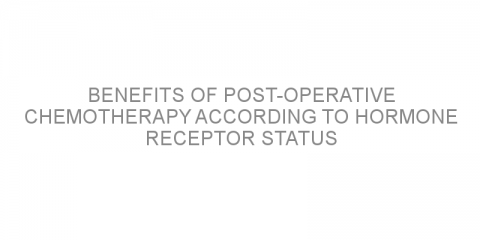This article discusses how tests such as the Oncotype DX or Mammaprint can be used to design individual treatment plans for patients with breast cancer. Patients with stage I and stage II breast cancer are treated similarly. Following surgical removal of a breast tumor, systemic (body-wide) treatment is often used. This secondary treatment is...
Read MoreConfined or spread disease-Confined only to the breast Posts on Medivizor
Benefits of post-operative chemotherapy according to hormone receptor status
In a nutshell This study compared the benefits of chemotherapy according to hormone receptor status. The main findings were: In cancers without hormone receptors, the benefits of adding chemotherapy were significant; In cancers with hormone receptors, chemotherapy only offered modest improvement. Some background Some...
Read MoreBenefits of postoperative chemotherapy vary according to breast cancer type
In a nutshell This study questioned the benefit of adding chemotherapy to postoperative hormonal treatment in the case of lobular breast cancer. Their findings were that chemotherapy seems to offer no additional beneficial effects in women with lobular breast cancer receiving hormonal therapy. Some background There are two main types of breast...
Read MoreEvaluating the addition of Capecitabine to postoperative standard chemotherapy
In a nutshell This article presents summarized data from two clinical trials. The trials evaluated the addition of Capecitabine to standard postoperative chemotherapy for patients with high risk early breast cancer. Some background Capecitabine is a chemotherapy drug that is taken orally and slows the growth of tumors. It can be...
Read MoreChemotherapy and Tamoxifen versus Tamoxifen alone after Breast Cancer Surgery
In a nutshell In this study chemotherapy and Tamoxifen were compared to Tamoxifen alone as complementary treatments after surgery for breast cancer. The main finding was that better results are obtained by adding chemotherapy. Some background Tamoxifen is a drug used for tumors which require the female hormone estrogen to grow. It...
Read MoreDetecting cancer cells in the blood stream as means to predict recurrence
In a nutshell The present study evaluated whether the presence of cancer cells in the blood stream predicts a worse prognosis in women with operable breast cancer. The main finding was that progression-free survival (time before cancer progression) and overall survival were lower if circulating cancer cells were detected in the blood. Some background...
Read MoreObesity is associated with lower survival rates in women with ER positive HER2 negative breast cancer
In a nutshell The present study examined the association between obesity and survival rates by breast cancer subtypes. They found that survival rates were lower in obese patients, particularly in women whose tumors were hormone receptor positive and HER2 negative. Some background Obesity is defined as a Body Mass...
Read More








